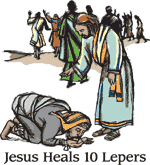Living Gratefully
A number of years
ago I was having breakfast early in the morning at a neighborhood restaurant. As the plate of eggs, bacon, and toast were
placed in front of me, I bowed my head to say grace. When I lifted my there stood the waitress.
“Something wrong with the eggs?” she asked?
“No,” I said, “I was just saying
grace.”
“Oh, not many people
do that around here,” was her reply.
It seems to be human
nature to forget to say, “Thank You.” We
all understand and appreciate the importance of gratitude. In fact, one of the first things we were
taught and that we teach our children is to express their gratitude. When someone gives them something, we ask,
“Now what do you say?” And the child
learns from an early age the answer “Thank you.” And certainly we all know as adults that we
appreciate being thanked. Yet, when it
comes to giving thanks to our heavenly father, we often miss the mark.
And when it comes to
giving out thanks to God, I don’t suppose there is any story in the Bible that
is so endearing to us, so timelessly appropriate, as the story of Jesus healing
the ten lepers.
Always the master
storyteller, Luke wastes not a word as he introduces our story. “Standing at a distance,” indeed! That was the plight of everyone certified by
the priests as a “leper.” When the wind
was blowing from the leper toward a healthy person, it was prescribed that they
must stand 50 years in the distance.
Removed to “reservations” in valleys and gorges outside of the towns,
they were kept far from family and friends.
Food was carried and left a safe distance from the colony, a neutral
area, to which the members of the colony would then come. When it was necessary to go into the town,
the leper would shout “Unclean! Unclean!
Some carried a little bell. Its
tinkling sound very nearly mimicked the terrible word: “Ding-a-ling! “Unclean”
“Unclean!” The alienation and loneliness were as
pressing a burden as the disease.
In ancient Hebrew
tradition, “unclean” was a ceremonial term, not a medical one. To be a leper was to be “unclean: before God
as well. Though not considered a sin in
itself, leprosy was viewed as an act of God.
Priests were required to identify both the curse of the disease and the
miracle of its cure. The book of
Deuteronomy gives precise instructions.
Healing was invariably interpreted as a miracle of God. To be a leper was to live as if under the
judgment of God on the one hand and outside the grace of God on the other.
No wonder, then,
that they cried, “Jesus, Master, have a mercy on us!” Mercy and grace were the only source of hope
for healing the disease, ending the alienation from God, and providing
restoration to the fellowship of family and friends.
Luke continues the
story: Jesus commands the 10 to go and show themselves to the priests. Obeying Jesus, they went, and during the
journey they were healed. If ever there
were candidates for spontaneous gratitude, they must surely be those 10 newly
cleansed people.
It may be assumed
that nine continued on their journey to the priests for the verification of the
healing. But one of the 10 overwhelmed
by the miracle of grace he had received, momentarily abandons the journey to
the priests and returns “praising God with a loud voice,” and “he fell at
Jesus’ feet, giving him thanks.” Luke’s
next words add to the impact of the apparent ingratitude of the others. “Now he was a Samaritan.”
Gratitude is
spontaneous. It cannot be manipulated or
cajoled. It cannot be purchased.
Go With God,
Pastor Qualley



No comments:
Post a Comment